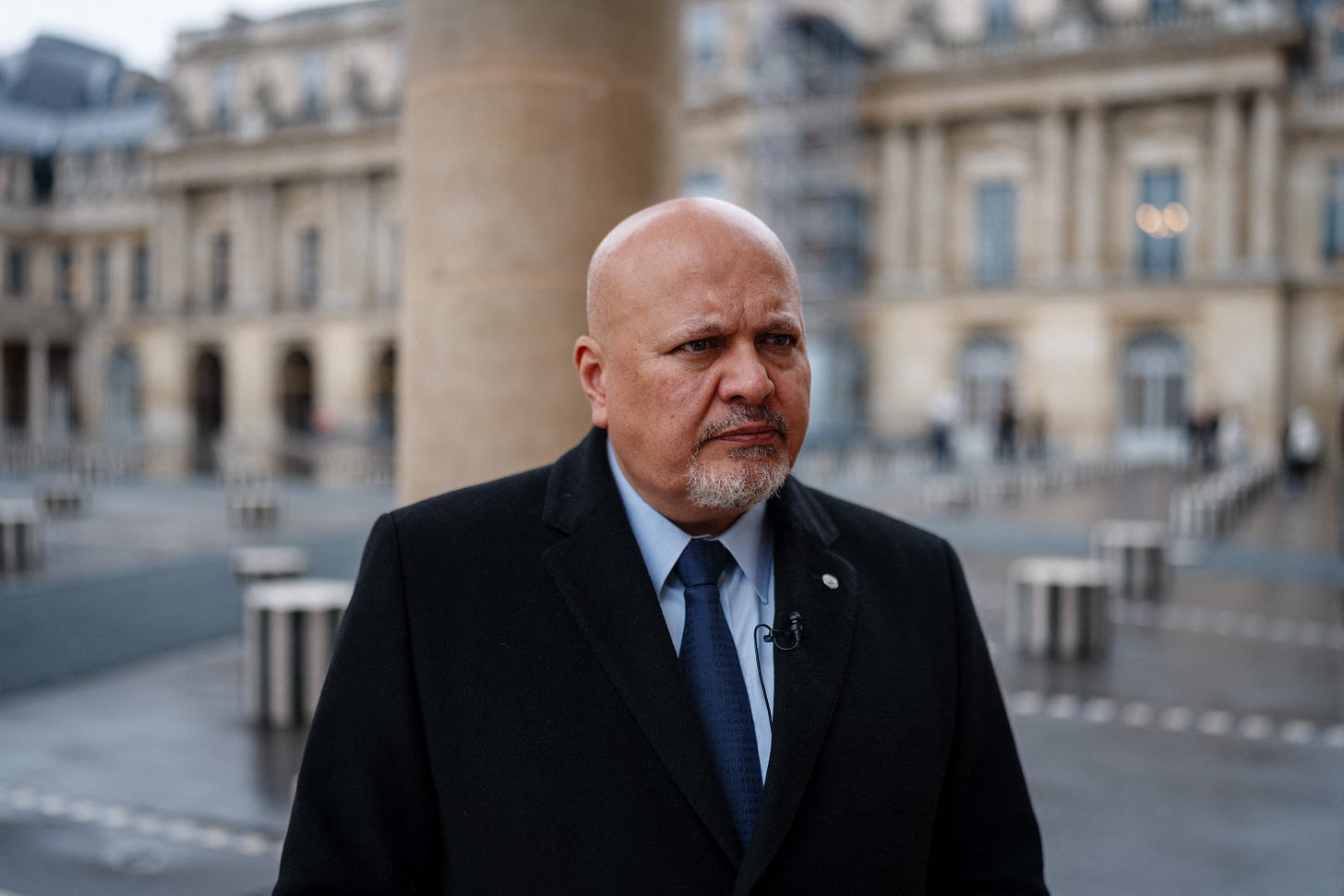The ICC Is Playing Politics with International Law
Prosecutor Karim Khan’s warrant application has serious legal, factual, and moral weaknesses.

THE THEORY BEHIND WAR CRIMES as a category is that even in violent mortal struggles, morality still applies. The same principle forms the foundation for the distinction between just and unjust wars, between self-defense and aggression. The problem is that there is no law without politics—and the announcement this week of International Criminal Court (ICC) Prosecutor Karim Khan’s application for arrest warrants against Israeli Prime Minister Benjamin Netanyahu and Defense Minister Yoav Gallant for alleged war crimes and crimes against humanity in Gaza seems to have more to do with politics than law. Khan’s lawless intervention, though draped in elaborate legal reasoning, is the product of a nakedly political scheme. Ostensibly designed to satisfy both sides of the conflict, or at any rate to dissatisfy both, it threatens not just the norms and standards of international humanitarian law, but the principle of just war itself.
Khan announced warrant applications for Israel’s leaders alongside warrant applications for a trio of Hamas leaders responsible for October 7 in a clear demonstration of moral equivalence that puts the arsonist and the firefighter on the same ethical plane. Hamas reacted by complaining that the ICC judgment sought “to equate the victim with the executioner.” This observation was incontrovertible, though not in the way they intended. President Biden was right to denounce the prosecutor’s application as “outrageous.”
It didn’t have to be so—and indeed Khan’s statement is not entirely without value. His office determined that Hamas had orchestrated vicious crimes against Israelis, “including rape,” which other international organizations, most notably UN Women, ignored for almost two months. In the continuing climate of hysteria that erupted last October in which the Jewish state is a scapegoat for all the ills of the modern world, this admission of the iniquity of Israel’s foes is not nothing. As Israel faces unfounded claims of genocide—including at the International Court of Justice—it’s also refreshing for an international body to recognize that Hamas’s goal is “extermination.”
HAMAS HAS BEEN COMMITTING obvious war crimes for sixteen years, and they even boast about them. The ICC case against Netanyahu and Gallant, by contrast, is weak on the evidence and riddled with legal and logical flaws. For starters, Israel is not a signatory to the Rome Statute that established the ICC. Countries are presumptively not subject to treaties they have not signed. Khan addresses this inconvenient fact by claiming the ICC “can exercise its criminal jurisdiction in the . . . State of Palestine.” Of course, no such state exists. The Israeli government was nonetheless cooperating with the ICC’s legal process before it was abruptly terminated, suggesting the “investigation” was less a fair-minded inquiry than a sham.
Khan further asserts that “the war crimes alleged in these applications were committed in the context of an international armed conflict between Israel and Palestine, and a non-international armed conflict between Israel and Hamas running in parallel.” To paraphrase the question frequently attributed to Henry Kissinger, what phone number does one dial to speak to the head of the State of Palestine? It has no government, no diplomats, no army. It cannot sign treaties nor decline to sign treaties.
The Palestinian Authority uses the name “State of Palestine” in its role as an observer, but not a member, of the United Nations. But it’s not apparent that there’s an armed conflict between Israel and the Palestinian Authority, and Khan’s announcement makes no effort to demonstrate that there is. Khan almost gives the impression that Hamas is the undisputed government of a universally recognized and actually existing State of Palestine. If that were the case, why are its leaders only coming under scrutiny for war crimes now?
One day, hopefully, there will be a state of Palestine, and its government will be honest, democratic, peaceful, and responsive to the highest aspirations of the Palestinian people. But for now, speaking of a Palestinian state or a mythical Palestinian army is not only nonsensical—it offers Hamas a claim to legitimacy that it does not warrant. Khan doesn’t identify the leaders of Hamas as the leaders of the State of Palestine, but he’s opened the door for them to identify themselves as such.
MANY OF THE OTHER CLAIMS in Khan’s announcement are heavily dependent on the evidence his office has to substantiate them. That evidence isn’t public and doesn’t have to be, but there’s reason to be skeptical that it supports his claims.
The ICC prosecution alleges that Israel has “intentionally and systematically” deprived Palestinians of food, water, electricity, and other necessities during its campaign in Gaza. Israel temporarily cut off pipes that deliver water to the Gaza Strip in the early days of the war. That’s Khan’s best case of a war crime, and it’s not as open-and-shut as he describes: Those pipes only accounted for an estimated 10 to 13 percent of Gaza’s water usage. These claims could turn on the difference between what Israel owes Gaza as a neighboring territory, and what it owes Gaza when it’s occupying Gaza, and whether Israel was occupying Gaza when it cut off water and closed border crossings, and what exactly it means to be “occupying” a territory under international law.
The ICC prosecutor further accused Israel of “intentionally directing attacks against a civilian population,” “persecution,” “extermination,” and other “crimes against humanity.” This series of incendiary accusations belie Israel’s routine attempts during this conflict to move aid into the Strip. It also ignores the reality that delivering aid in active combat zones is almost impossible and that it turns Israeli soldiers into easy targets. Israel has facilitated the entry of more than 542,000 tons of aid even while Hamas confiscates the aid and hinders delivery. The ICC claims also run counter to Israel’s painstaking efforts to reduce civilian suffering, doing “more . . . to avoid needless civilian harm than virtually any other nation that’s fought an urban war, ” according to an urban warfare expert at West Point. Israel’s rules of engagement against such a wicked foe are so stringent that its campaign against Hamas has invited comparisons to America’s own campaigns against ISIS and al Qaeda.
Unquestionably, the war against Hamas has caused grievous harm to the Palestinian population of Gaza, but this is the result of Hamas’s choice to start a war and its abominable strategy of fighting around and under civilian infrastructure. The same logic could apply to Khan’s charges of “wilfully causing great suffering, or serious injury to body or health,” “cruel treatment as a war crime,” and “starvation of civilians as a method of warfare.” Maybe the evidence will show that the Israeli government intentionally ordered all of these things, though it may also be that they were the inevitable though unintentional results of warfare in an area that Hamas deprived of investment and infrastructure development for 16 years.
None of this is to say that the Israel Defense Forces have been perfect. They have almost certainly committed war crimes in Gaza—there have been too many high-profile mistakes and videos of individual soldiers posting likely criminal conduct to pretend otherwise. But the warrant application for Netanyahu and Gallant assert that these were matters of state policy, rather than failures of integrity and discipline by an overworked army made up mostly of conscripts, who should be subject to prosecution under the Israeli system.
THE CENTRAL DEFECT IN THE ICC PROSECUTOR’S case is that it would prevent civilized nations from defending themselves against sworn enemies bent on their destruction. It is impossible to wage war anywhere without creating humanitarian catastrophe, but especially in Gaza, largely thanks to Hamas’s misrule. Does that make Gaza immune from the international laws of war? The proximate cause of Khan’s warrant application is Israel’s defensive war. On one side of this confrontation stands Israel’s imperfect but genuine democracy, fighting to reclaim its captives and defeat the jihadist forces that initiated an unprovoked war of aggression. On the other side is Hamas, a theocratic regime whose raison d’etre is to exterminate world Jewry.
In other words, Israel confronts an enemy who, despite openly repudiating their own obligations under the international laws of war, seeks to cynically exploit those same laws to criminalize Israel’s inherent right to self-defense. If nations are frustrated in their attempts to wage just wars, there will be only unjust wars. The barbarians will inherit the earth.
The ICC project to enforce international “law” against Israel, wittingly or not, is thus a double mistake: First, out of a misplaced desire for balance and neutrality, it draws no distinction between the motives behind military action, as if terrorists taking up arms to slaughter the innocent are legally no more culpable than democracies that take up arms in response to slaughter and to prevent the repetition of slaughter. The superficial balance also exculpates other malign parties to the conflict—Khan sought no warrant for officials in Iran, which played a crucial role in the October pogrom in Israel.
By any rational standard, including that outlined in Article 51 of the United Nations Charter (of which Israel is a signatory), Israel is waging a just war in Gaza. Even if Israeli soldiers commit war crimes during the war—for which they should be duly prosecuted—the war itself is purely in self-defense. By racing to accuse everyone of equal criminality, the ICC prosecutor risks eroding the principle that separates just war from unjust war—the same logic that makes the category of “war crimes” possible in the first place. In his treatment of unequals as equal, Khan has let politics overcome both law and morality.





